Healthy food to stack up on during quarantine or isolation!
How do I stay healthy? How do I store the food? How should you know what to get if you get quarantined? Should it stay fresh for long? Does it have to stay fresh for long? Will the city or country run out of food? Do I need things that don’t need a fridge? What is smart to buy? How do I still eat and remain healthy in all of this?
All these questions and more are probably running through your mind at the moment. And with good reason.
In this post, we’ll teach you what you should stack upon in order to stay healthy, on track with your macros, and in positive spirits.
The two key takeaways from this post are:
- There is a lot of stuff you think has to stay in the fridge that doesn’t have to!
- You can divide the food you need into 4 different categories:
- Food you can keep in a pantry or a dry place: sweet potato, eggwhite, eggs (to a certain extent), lentils, oranges, butter, rice, bouillon, apple, tortillas, almond- oat- soy and pea milk, granola, nuts, tortilla, jam, beans, canned mackerel, tuna
- Food you can eat without having to cook it: hard bread, bread, cheese, canned mackerel, vegetables, salmon
- Food you can have in the freezer: chicken, fish, meat, frozen vegetables, and fruit
- Food that must be in the fridge: chicken, fish, vegetables, yogurt, milk, berries
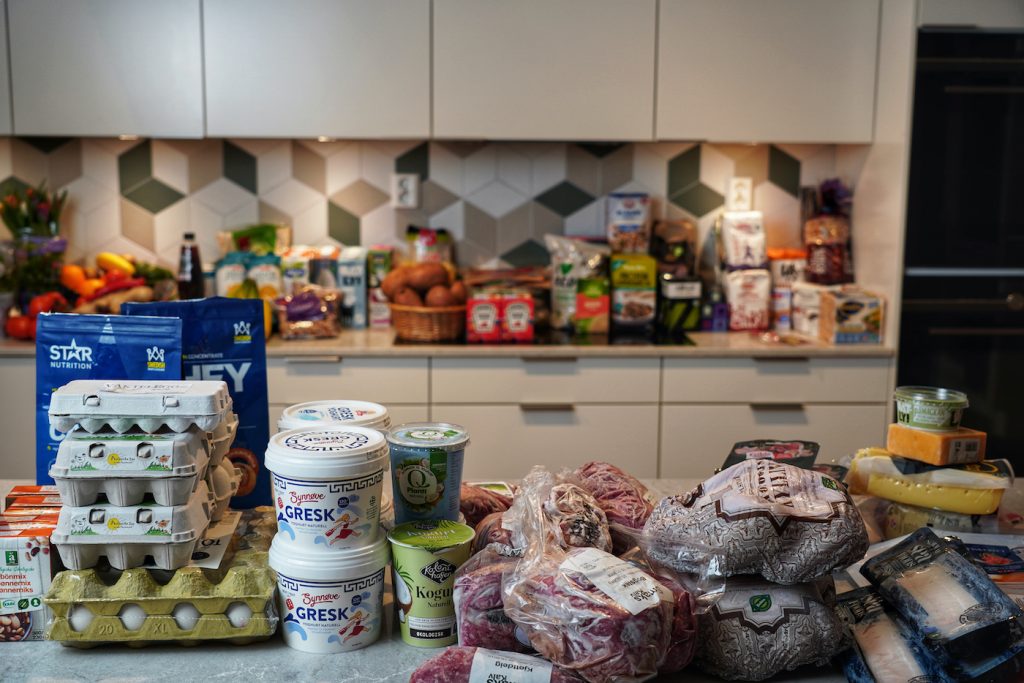
If you want to know more about what and how you can eat when you are sick or what top 10 foods to boost your immune system you can click either of the linked post ?
Table of Contents
Fridge, freezer vs pantry – the basics
When deciding on what to get there are 3 main things you should focus on:
- What are the protein sources than you can eat in the next couple of days/ weeks? These can stay in the fridge.
- What can you keep as a protein source in the freezer that will last you longer?
- What can you keep in a pantry? This is the stuff that you keep as a backup.
Why I am splitting it up in these 3 is simply because this is important!
You don’t want all your food to be dependent on a fridge or freezer. You want to keep some stuff outside the freezer or fridge, just in case the power goes out.
This will probably not happen, at least not now, but what is the harm in thinking ahead?
Most of us don’t have facilities that are made for storing food cold for a longer time. Two main reasons for that, your fridge or freezer simply doesn’t have the room, they are too small. Or if the power goes out, you’re not self-sufficient. You’ll lose power straight away and your food will start de-frosting.
Let’s assume that losing power isn’t a problem for now. But it is still important to be knowledgable about what foods actually don’t have to stay in the fridge. So you don’t take up unnecessary space.
Therefore, we have prioritized protein and fat sources in the fridge and freezer. This can be for example meat, chicken, fish, yogurt.
Typical foods that people think have to be in a fridge but doesn’t is butter, eggs, sweet potato, almond milk (keep in fridge after opened, will last for about 4-5 days), fruits, onions, ginger, chili, garlic, tomatoes etc.
Keep in mind that if eggs have been cold, they must be kept cold. This means that if they’ve been a fridge either at your house or in the store, they must remain in the fridge or a place where they will be kept cold.
Also, butter doesn’t have to be kept cold. But it is sensitive to light. So keeping it in a box in a pantry or similar works great.
Macros
Even though you’re in quarantine you should focus on getting the right combination of macros. You probably don’t want all your hard work to go to waste!??
You should focus on a healthy balance between protein, carbohydrates, and fat. The reason why is simple. Of course, you want to stay on track, but a healthy balance of macros will keep your mind and body more awake and at peace.
Being unable to go outside can be really strenuous for a lot of people. Making sure your head and body is at it’s best is important.
In one way it might be easier because you are in complete control of what you eat – no eating out or friends over. On the other hand, it might be really hard, because you are home all day, and that way, the cravings can come easier.
So, it’s all about making stuff easy for yourself. Don’t buy a lot of unhealthy things, you’ll end up eating them. And since you probably shouldn’t go outside too much, then you won’t be subjected to temptations like before.
Let’s look at why the different macros are important and what the main challenges can become.
Protein
Protein is as always, very important! Not only will it ensure you keep your muscles strong, but it is also a healthy macronutrient and that your body needs as a building block.
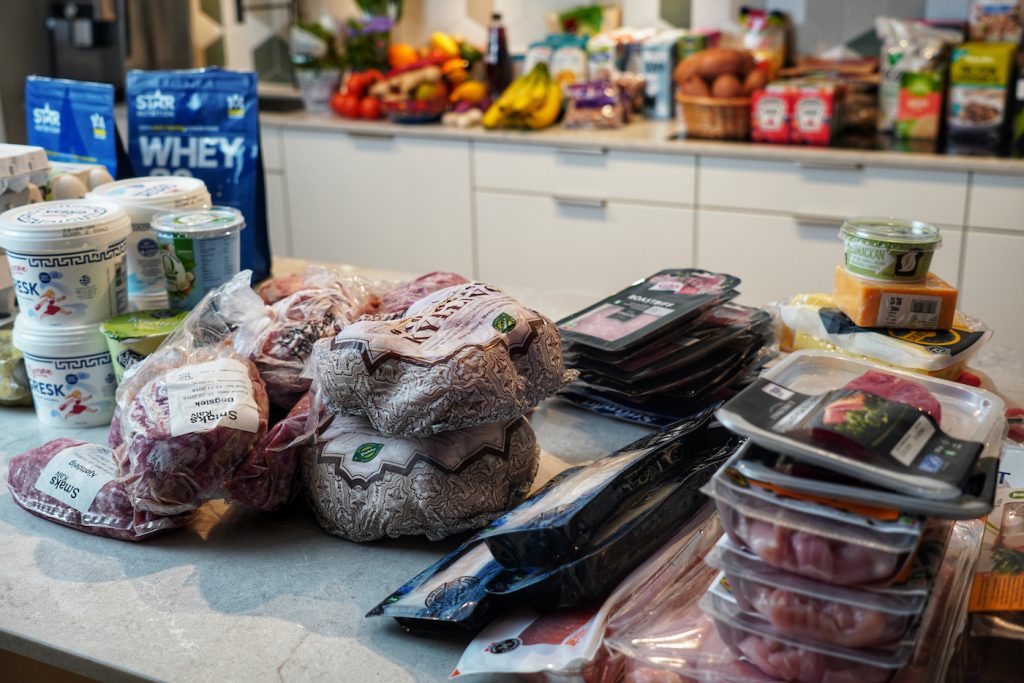
The main challenge with protein is that if they are animal-based there’s a limit to how long they can stay fresh either outside or inside a fridge. Outside the fridge the amount of time it will stay fresh is very small, in the fridge, it is longer.
However, most of these protein sources won’t stay fresh for at least no more than a couple of weeks. So here, fridge or freezer space is essential.
Fat
Fat will keep you full. You need less fat than carbs to get full. This is great with regard to storage space. Your brain also needs fat to function properly.
You can have fat sources such as sour cream, avocado, and salmon, but there is a limited time it will stay fresh. But different kinds of nuts and nut butter will stay fresh for a really long time and can be kept in the pantry.
Also, many of the other fats such as butter, olive oil, coconut oil, etc aren’t really things you eat, rather things you use for cooking. So, getting enough HEALTHY fat can become a problem in the long run.
I don’t recommend consuming fat from unhealthy sources such as chips, chocolate, cookies etc.
The sugar rush is terrible for your body and brain and will render you unfocused and fat, and nobody wants that..
Remember, that when there are restrictions on where you can go and gyms are closed you use way less energy than before. So, you also need less food than if you’re very active.
Carbohydrates
This is your body’s fast fuel! You need this to do the stuff you’re doing and keep going. However, keep in mind that your activity level will probably change, then you need fewer carbohydrates.
That being said, this is probably one of the easiest macro sources to stack upon. Because it can stay in the pantry, for what feels like forever. So naturally, you might have quite a bit of this.
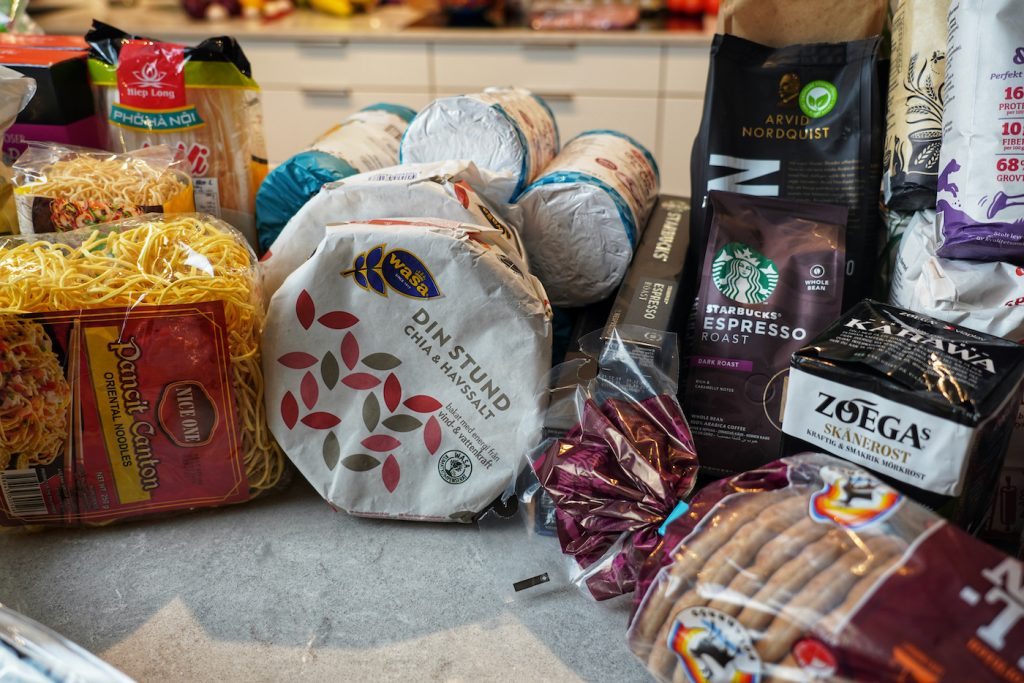
The main challenge with carbohydrates isn’t that it is hard to store. It will be that it is easy to consume and it tastes good! So try your best to limit yourself.
To conclude, many carb sources will stay fresh for almost forever, this is not your problem. Your problem is getting enough fat and protein.
Tips & tricks
There are a couple of tips & tricks you can use to either prepare for different situations or create alternative solutions.
Do you have a small fridge or freezer?
- Live in a cold place? I would consider getting a box you can close and a lock. That way you can keep food there in case the power goes out.
- Live in a warm place? Getting a freezing container/ box can be a smart investment. Many stores now sell ones that you can plug into an outlet. This can work as extra fridge space. If you lose power this can also keep the food cold for a small period.
What to get at the store?
So what should you buy?
This post is split into three, based on how you should store the food: Fridge, Freezer, Pantry. In each part, I’ll also focus on Protein, Carbohydrates, and Fat.
Food to keep in the fridge
Food you keep in the fridge is the food you should plan on eating within the expiration date.
It is important when you plan for shopping to think of how much can the fridge keep, but also how much can you actually eat?
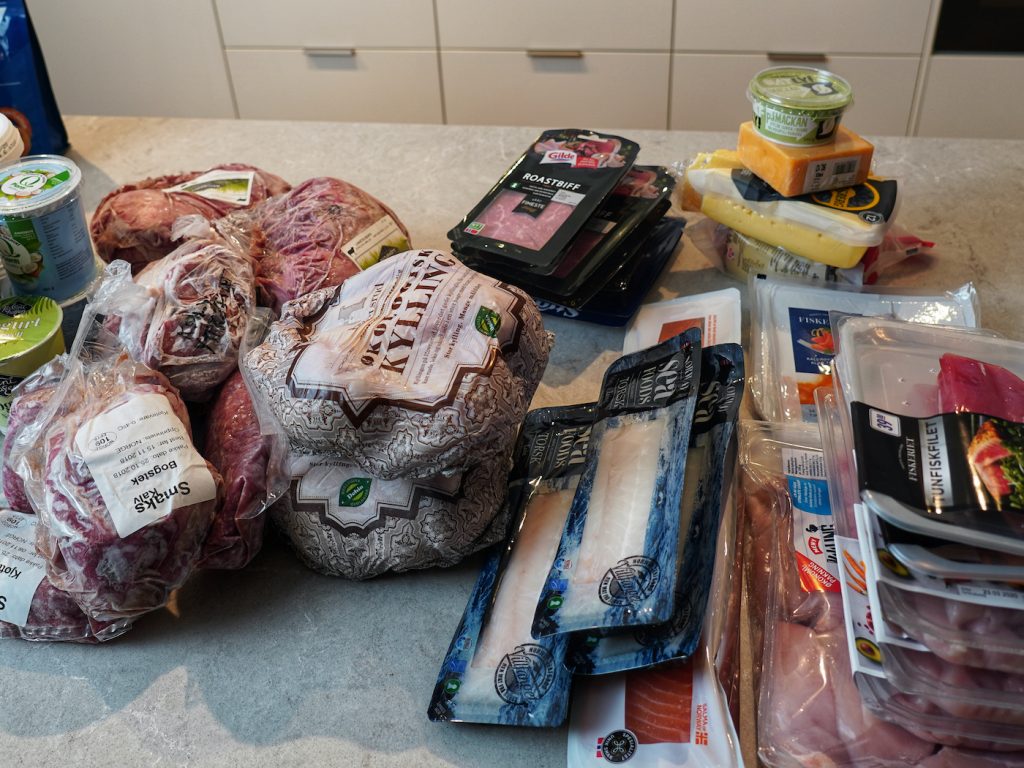
Protein sources:
- Chicken breast: this is a lean protein source and very protein-dense
- Salmon: has a lot of healthy omega3 and can be eaten raw (make sure it’s not wild salmon as you can’t eat that raw due to bacteria)
- Cod: has idoine which is important, can be both cooked in the oven, pan or boiled
- Greek yogurt: a real luxury in the beginning and a good protein source.
Try to get hold of a greek yogurt low on fat. This can you also keep in the fridge for a long time - Cheese: you can keep hard cheese/ matured cheese for a long time in the fridge. Keep in original packaging. If moldy you can take a cheese grater and cut it off.
- Milk: if you can drink milk this is a great protein and calcium source
- Scampi or shrimp: if buy pre-cooked, you don’t have to cook them at home
- Whole chicken: is protein-dense, has some fat which will keep you full for longer and it also as collagen which is a really healthy protein that we get waay to little of in today’s society (you get it from cooking the bone and bone marrow), collagen is important for our tendons, ligaments, skin and muscles. You can also make bouillon on the leftovers.
- Meat or beef: a great protein source, make sure it is grass-fed so that it is high on Omega3
Remember! When you purchase fish, chicken or meat at a grocery store check the expiration date and try to purchase food that has a long expiration date.
Don’t open the package before its time to eat, as they are packed in a way that will ensure the food remain fresh longer. Consider to freeze down after you’ve opened it.
A trick we also use is to cook the food. Cooked food can be kept for 3-4 days in the fridge according to Mayo Clinic. You can also put it in the freezer.
Fat source:
- Butter: this can also be kept outside the fridge, butter is light-sensitive so it should be kept out of light in for example a dark box, but doesn’t have to stay in the fridge
- Sour cream: a great fat source that will add a lot of taste to your meal
- Chilimayo: might not be healthy, but I try to not eat that much milk products, so this can save a boring meal.
Carbohydrates:
- Vegetables: such as cucumber, carrots, lettuce, spring onions, onions, broccoli, cauliflower. Lettuce, broccoli, and cauliflower stay fresh forever it seems.
- Fresh yeast and sourdough: although this is not a carb in itself it will be when you make bread?
Food to keep in the freezer
Keeping food in the freezer is great because you can keep it fresh for longer than you are able to in the refrigerator.
Protein
- Chicken breast: You can keep it both raw and cooked in the freezer. It can be nice to have some cooked in case you run low on electricity. Then at least you have some chicken that is cooked that will keep you going for about a day or two until you find other solutions. This, of course, depends a lot on the temperature where you live.
- Salmon: high on Omega3. You can cook it in many different ways, for example in a pan, oven or barbeque, but you can also eat it raw. You can’t eat all salmon raw so make sure this is ok.
- Cod: high on idoine, can be both cooked in the oven, pan or boiled
- Scampi or shrimp: if buy pre-cooked, you don’t have to cook them at home.
- Whole chicken: uncooked or cook it and divide it up and freeze it.
- Meat: both minced meat, steak, and beef is high on protein, but make sure it is grass-fed so that it contains a lot of Omega3
Fat:
- Frozen avocado: Avocado is an amazing fat source, healthy and tasty and it can be used in both dinner, breakfast, etc.
- Butter: It can easily be frozen down, but remember you can also just keep it out of light.
- Icecream: not the most healthy choice, and quite contradictory to my rant above about staying healthy. BUT this can come in handy ?
Carbohydrates:
- Vegetables: vegetables will get old very fast, but if frozen you can eat well for a long time!
- Berries: same as above, frozen they can last for forever, berries are important for antioxidants
- Fresh tortilla: also not the most healthy carb choice, but there are not that many carbs that can be frozen, and this will keep for a long time
- Bread: same as above, not the healthiest carb choice, but it can be frozen and it will keep you full
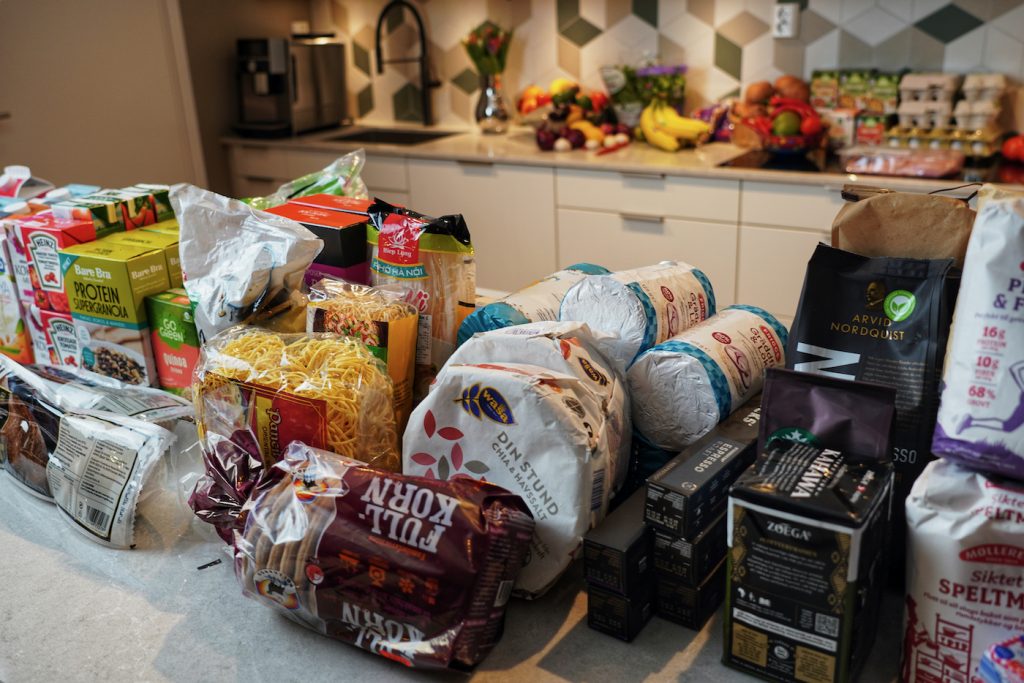
Pantry
Protein
- Eggs: an excellent protein source, it’s great for breakfast, lunch, and dinner. You can cook it, boil it, make omelet or scrambled eggs. It is also great for baking, for example, banana pancakes, waffles, etc.
- Eggwhite: super high on protein and low on fat! You can make an omelet or scrambled egg whites, add some vegetables and you’ve got yourself an awesome protein-heavy lean meal! PS. You can also freeze down eggwhite, but it should be defrosted in the fridge.
- Lentilles: Lentilles are great because you can store it for a long time. Although high in protein its also high on carbs, so beware! It can be used raw in salads or you can, for example, cook them as part of a stew.
- Beans: they also have quite some carbs, but are also great because you can keep them for a long time. You can also eat them raw or cooked.
- Canned Tuna: this can be stored forever, and is packed with protein.
- Canned Mackerel: this one too can be stored forever, and is also packed with protein and omega3.
- Beef jerky: also a great protein source that you can keep in the pantry. It comes in all sorts of different tastes.
- Soy milk: is also quite carb intense, but compared to almond or oat milk it as more carbs.
- Whey & casein: this is as always great if you are unable to consume the required protein from food sources. Whey & casein which is low on fat & carbs is preferable. Although for this purpose, you might consider more one with more fat so it’ll keep you more full.
- Protein pancake/ waffle mix: not a must, but great if you want a healthy snack high on protein.
- Protein bars: bars last for a long time so they are ideal for these kinds of situations. Try to choose kinds that are well-balanced when it comes to macros, and that is high on protein.
Fat
- Chocolate: not the best fat source, but it can be a lifesaver.
- Avocado: this is a great fat source! It won’t stay fresh for that long unless you freeze it of course, so this is a luxury at the beginning
- Coconut oil: is great for cooking and it can be stored for a really long time. In addition, you don’t need a lot of it when you cook with it.
- Butter: Adds great taste and only requires a dark space or box.
- Olive oil: Healthy fat source that will add taste to your food. I recommend not cooking on high heat with olive oil, you lose the benefits of the oil, then you should use coconut fat or butter instead.
- Coconutmilk: can be used in stews or in coffee.
- Nutbutter: can be used as a fat source on bread or hard bread, or in pancakes, waffles, etc for extra fat
- Nuts & seeds: has a lot of great nutrients and will keep you full for a long time. It can also be used to make bread.
Carbohydrates
- Tomatoes & bananas: This is a real luxury at the beginning, it is tasty and healthy but stays fresh for maybe a week. Hence, this is not something you should buy a lot of but can be a luxury at the beginning.
- Oranges: keep it in a dark place and they stay fresh for a long time. Oranges have a lot of c-vitamins, which is very important. Especially, if you don’t have a varied diet.
- Lemons: same as above, it has a lot of C-vitamins
- Any kind of flour (spelt, rye, wheat etc): you can keep flour for a long time, and then you can make your own bread and is not dependent on store availability. I recommend spelt or rye, it is much better for the body to digest, and again, healthier.
- Pasta and noodles: a good carb source, but not the healthiest, but it will last for a long time. Also, all you need to cook it is water. Be careful eating it cold as leftovers due to food poisoning.
- Rice: same as the above, not the healthiest perhaps, but it will last a long time and all you need in order to cook it, is water. Be careful eating it cold as leftovers due to food poisoning.
- Sweet potato: a great carb source, it can be cooked in the oven, in an air fryer or boiled.
- Quinoa: also a good carb source, I really recommend adding a bouillon when you cook it for more salt and taste.
- Oatmeal: great for baking bread or for breakfast
- Hard bread: this keeps for a really long time, and can be eaten raw. Need I say more??
- Rice cakes and crackers: same as the above, it lasts for forever!
- Granola: Tasty and packed with all sorts of healthy and unhealthy things. Make sure you buy a good one, we usually by one that is a bit higher on protein than others. If not opened, this can also last you for long. It can be used with yogurt or milk. You can also use it if you make bread.
- Tortillas: These will just last for years! Might not be the best carb source in terms of how full you get per gram, or the healthiest one. But I take eating tortillas over starving any day…
- Yeast: not a carb, but when you use it for baking bread it will end up being/in one! Being self-sufficient and able to bake your own stuff is important when we don’t know what will happen in the future.
- Half baked bread: These can’t stay in your pantry for too long, make sure you look at the expiration date.
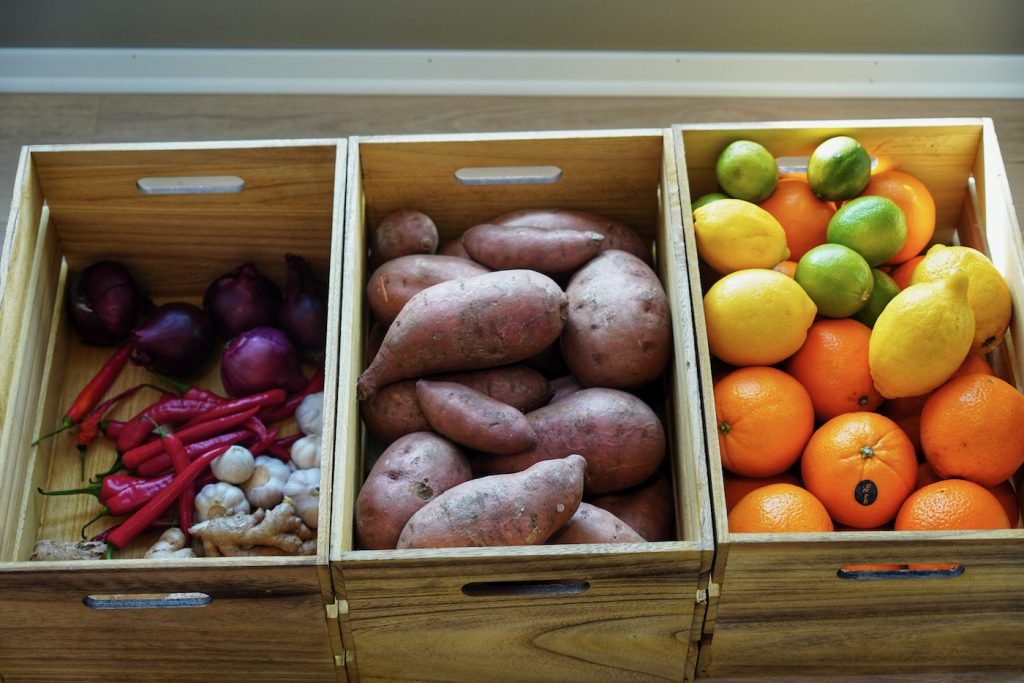
Lastly, there are spices. Such as garlic, turmeric, chili, ginger, these will last you for a long time and they add a lot of taste to otherwise boring food. These can stay in the pantry.
Ginger and turmeric are also great in order to keep healthy if you want to learn how to make a ginger shot you can read this post.
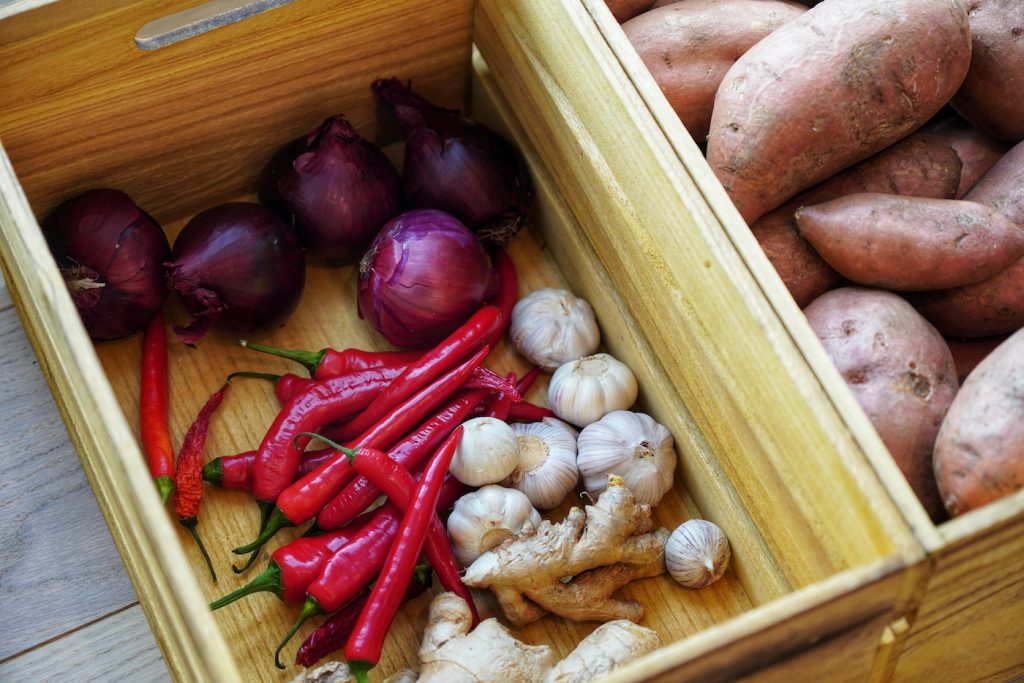
Do you want to see more of what you should eat? Check out this video:
Other things you should get are of course coffee and tea ☕️ but also candles, lighter and matches, toilet paper, soap, propane gas for an outdoor kitchen or your barbeque.
We really hope this post will help you prepare and that you are now more sure of what to get at the store and how to store it!
Good luck and stay healthy ?
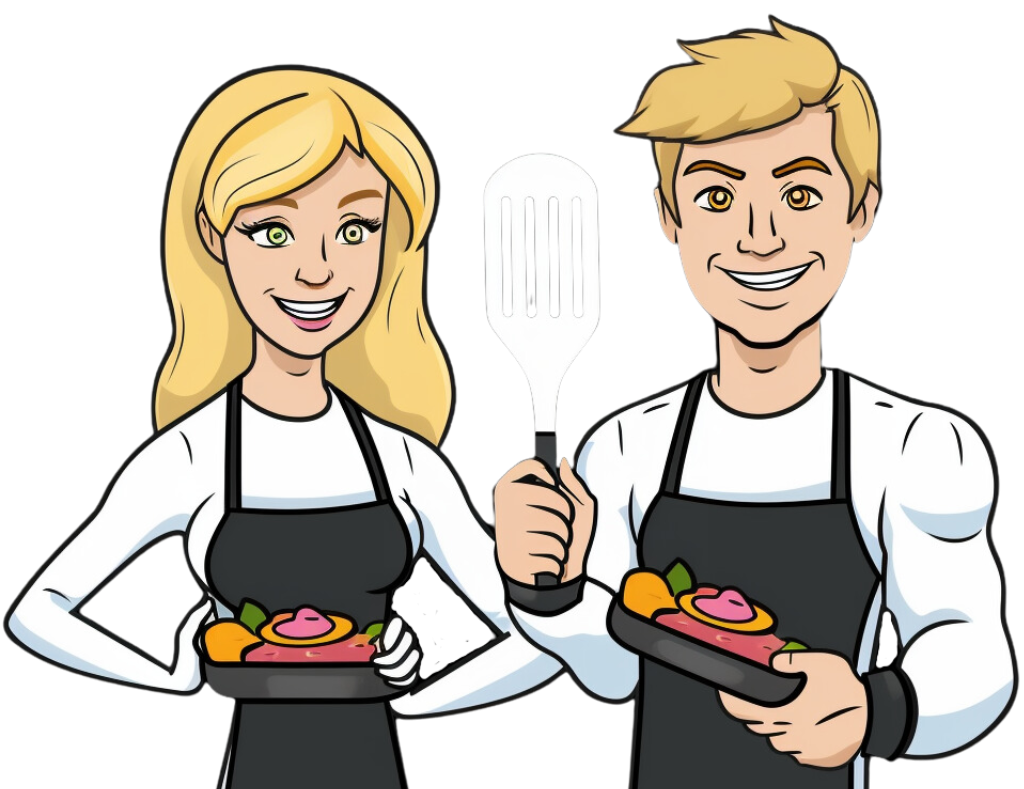
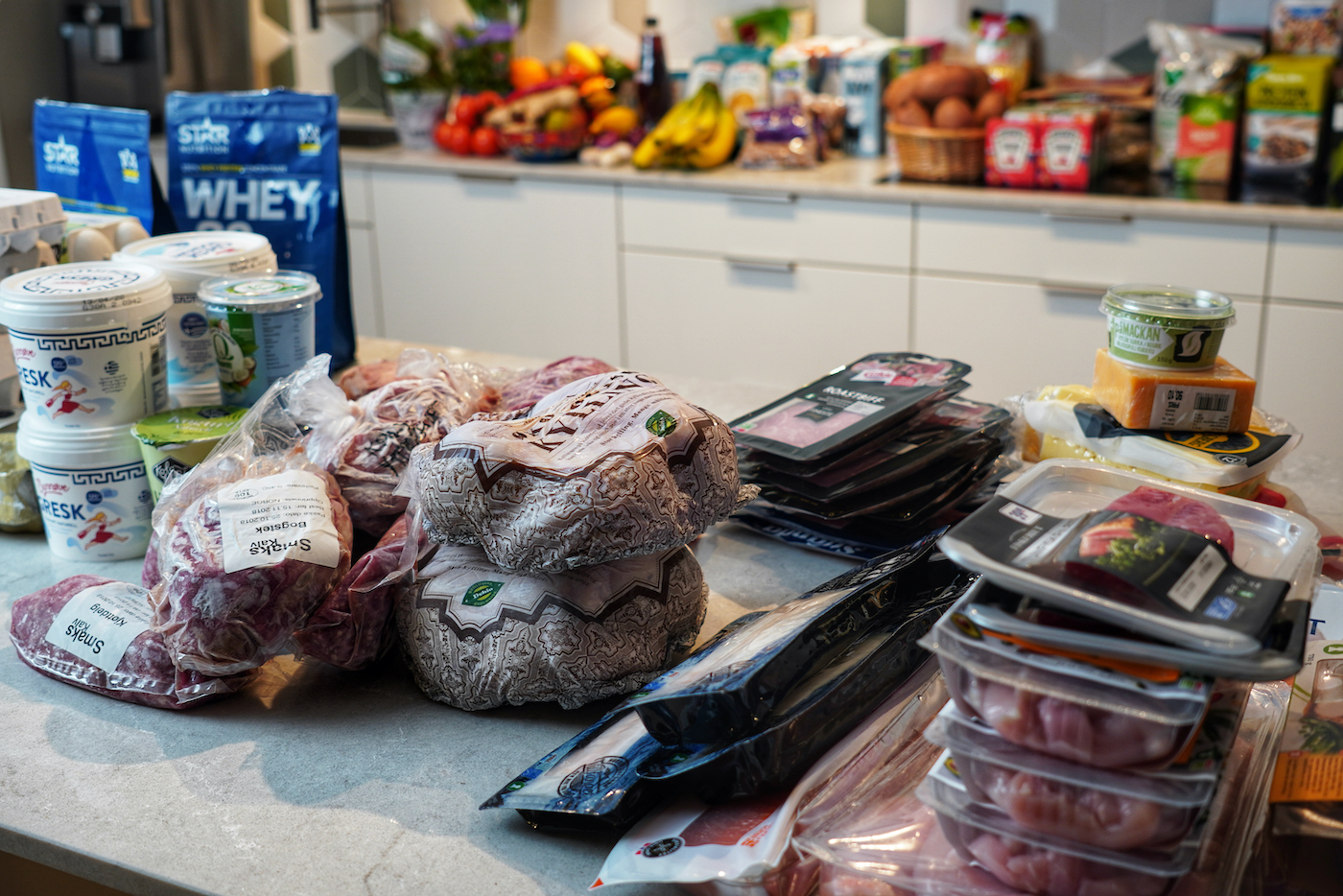




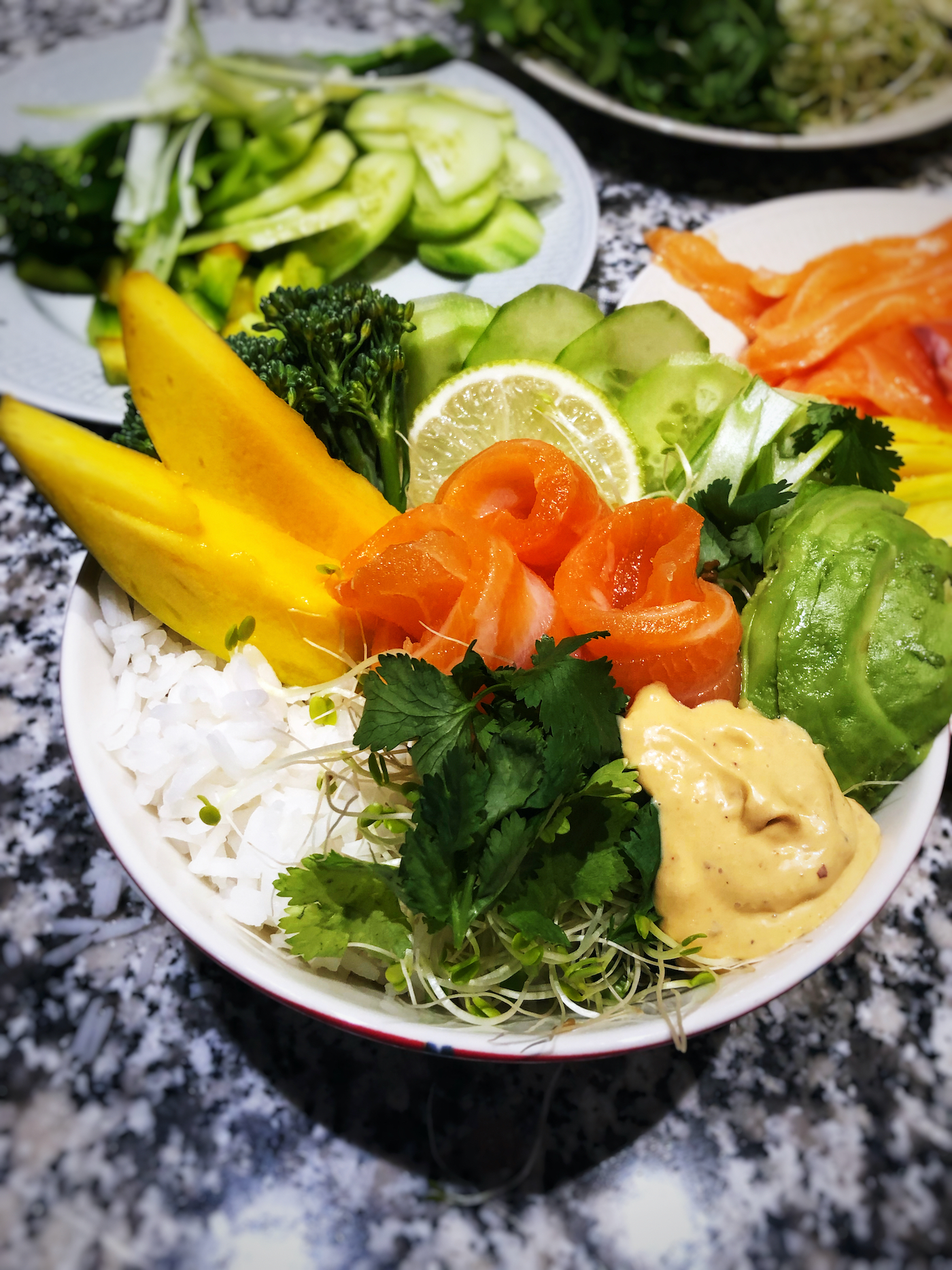


One Comment